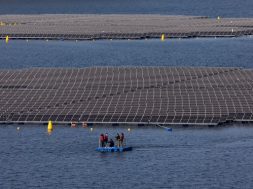
The Need for Practical Solutions to India’s Coal Energy Paradox
The Indian economy is heavily dependent on coal. Infamous as the world’s fourth largest polluter, close to 60 percent of India’s power supply is derived from coal fuelled power plants. Consequently, in 2016, half of the country’s emissions – 805.4 million tonnes – came from the power sector. However, for the country to meet its development goals, and lift millions out of poverty, demands for energy are expected to more than double in the coming years. Furthermore, an estimated 600 million or 40 percent of Indian population is likely to live in cities by the year 2031.
India therefore faces a great dilemma in maintaining a balance between its developmental goals and its rapidly deteriorating ecological balance.
Fallout of Coal Powered Energy Grid
The direct and indirect fallout of the coal powered energy grid is already palpable in India. Unprecedented high concentrations of particulate matter PM 2.5 routinely make Indian cities the worst polluted in the world. Pertinently, PM 2.5 is a tiny pollutant of less than 2.5 micrometres in diameter. The microscopic size of PM 2.5 allows it to easily lodge inside human lungs and enter the bloodstream, thereby causing a variety of ailments such as asthma, chronic bronchitis, lung cancer, and even death.
In 2015 alone, surpassing China, air pollution in India led to 1.1 million premature deaths, the highest in the world. Tellingly, ten of the world’s twenty most highly polluted cities are situated in India.
Also Read: Coal Country: Two Years After a Ban, Mining Persists in Meghalaya
Cost of Healthcare More Than Cost of Fossil Fuel Subsidisation
A recent report by the Health and Environment Alliance (HEAL), a leading European NGO, indicates that in 2014 in India the cost of healthcare exceeded the cost of fossil fuel subsidisation by eight times.
Other reports warn that while at present 2 percent of Indian population is exposed to extreme heat, continued use of fossil fuels at the present rate will lead to 70 percent of Indian population being exposed to extreme heat by 2100, leading to serious consequences for both people and food production.
Aware of its precarious situation vis-à-vis the effects of climate change, India, as part of its Paris Agreement commitments, undertook to derive at least 40 percent of its energy from non-fossil fuel sources by the year 2030.
Towards the end of 2016, the country had a total installed power generation capacity of 307.27 GW of which 46.33 GW or approximately 15 percent was derived from renewable resources. The government aims to scale up the share of power derived from renewable resources to 175 GW – including 100 GW of solar power and 60 GW of wind power – by the year 2022.
Also Read: Wastewater for India’s Coal Plants an Impractical Dream
To help put things into perspective, 1 GW of power is enough to light up 100 million LED bulbs. Since much of India receives abundant sunlight for most part of the year, solar energy has the potential to electrify thousands of villages.
Interestingly, this year, for the first time, solar power in India priced at Rs 2.44 per unit became cheaper than coal powered energy priced at Rs 3.20 per unit. Wind power too was competitively priced at Rs 3.46 per unit. While the cost of renewables may have dropped drastically, massive coal reserves, widespread availability, and traditional dependence on the resource make it a formidable enemy. For instance, fossil fuels still receive eleven times more financial support than renewable energy.
Expansion of Coal Energy Indicates Incorrect Estimation
The energy sector in India, however, is full of contradictory signals. To begin with, at the time of signing and subsequently ratifying of the Paris Agreement, India maintained the stance that it would continue to expand its coal powered electric grid by building new power plants. Thus, along with the increase in coal fuelled power, the share of renewable energy in installed power capacity would also be increased.
This planned expansion of coal energy indicates incorrect estimation and severely skewed planning, both environmentally and economically. Research by Christine Shearer and others shows that if all the proposed 370 coal plants are constructed, along with the planned 40 percent of power generation from renewables, it would result in excess production of electricity. Supply would far exceed demand and several coal-fuelled power plants would sit idle and become stranded assets. A similar study by Greenpeace corroborates the findings.
While it is true that under the Paris Agreement, climate finance of US $100 billion annually by 2020 for mitigation and adaptation was promised by developed countries to developing countries, a look at the annual Indian budget raises doubts about accomplishing the huge target of scaling up renewable energy power to 174 GW. The budget for 2017 allocated Rs 5,473 crore to the Ministry of New and Renewable Energy. This is only a marginal increase from the Rs 5,036 crore allocated in the budget of 2016.
Furthermore, the Goods and Services Tax (GST), a pan-India tax reform subsuming all forms of direct and indirect taxation which came into effect on 1 July, threatens once again to sway prices in favour of coal fuelled power and undo the gains made thus far by the renewable energy sector.
GST a Blow to Renewable Energy Sector
Under GST both solar power and coal fall under the 5 percent tax slab. Whereas earlier solar power was exempted from tax, the tax rate for coal has been slashed from the previous rate of 13 percent. Batteries for storage of renewable energy are being taxed under the highest tax slab of 28 percent.
Delivering another blow to the renewable energy sector is the diversion of the coal cess of over Rs.50,000 crore towards GST Compensation Fund. Even though the cess, originally collected for the purpose of funding National Clean Energy Fund was never fully utilised for green energy projects, it will now compensate state governments for revenue losses arising out of the implementation of GST.
Analysts point out that “transparency, longevity and certainty” are the benchmarks for sustaining investment in the renewables over the next few decades. Therefore, at this juncture it is imperative for the government to lay down clear and unambiguous policies on renewable energy with pragmatic timelines.
















